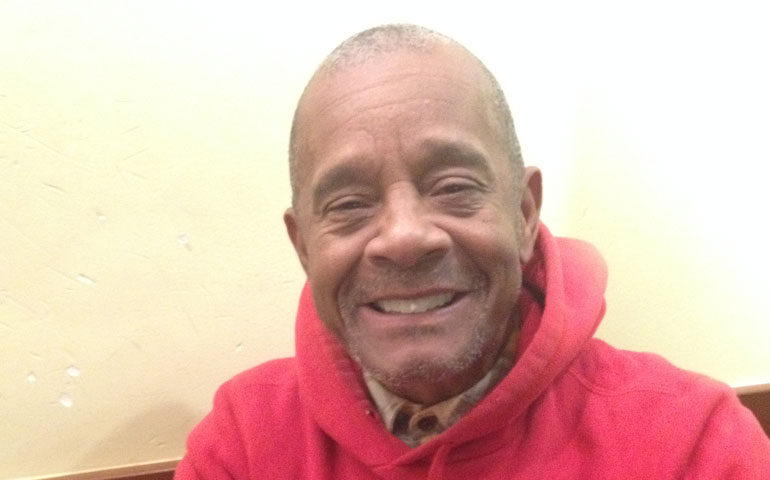
Milton Brown: "It was only God's mercy that saved me." (Helen Brosnan)
If you ever have a yen for comeback stories, and who doesn't, I have one for you. Meet Milton Brown. At age 64, he has endured so much violence -- emotional violence, military violence, street violence, structural violence -- that merely being alive is proof behind the often quoted line that what matters most in life is not what we achieve but what we overcome.
I met Milton five years ago when he was penniless and homeless, sleeping nights in a cardboard box on Washington's North Capitol Street across from the Government Publishing Office. For a time, he took refuge in a shelter on New York Avenue, but the noise, fighting and being forced to leave before dawn were negatives too severe.
For food, he went to the Father Mc-Kenna Center, named after Jesuit Fr. Horace McKenna, whose ministry to Washington's poor is legendary.
"What's hardest about homelessness," Milton believes, "is the vacant spaces of time, the loneliness of it all."
The emotional violence began in his childhood in Norfolk, Va. He never knew his father. His mother, burdened by poverty, abandoned him to the care of his grandparents. In 1968, with no money for college, he was drafted into the Vietnam War.
At 5 feet, 6 inches, he was the right height for combat in the miles-long network of tunnels of Cu Chi near what was then Saigon and where North Vietnamese soldiers covertly lived by day and emerged at night to battle Americans.
Armed with a flashlight, a bayonet and gun, Pvt. Brown became a tunnel rat and a killing machine.
Today, Milton can't recall how many North Vietnamese lives he took in his 11 months of tunneling -- five days in and five days out -- but he does remember the effect it had.
"I killed so many people in the underground that only heroin helped me not think about it," he said. "The heroin was supplied by the military, a fact not generally known by the American public. But it's true. I'm still haunted by taking the life of a boy directly in front of me. He was no older than 14."
Milton came home in August 1971 a heroin addict, a blight that would last until 2008 when he nearly died by totally withdrawing. He recalls the years as "a living nightmare. I had demons. It was only God's mercy that saved me."
His two marriages failed, one from 1971 to 1978, the second from 1979 to 1982. "I was hoping my wives could help me climb out of the hole I was in. But I was too far down for them to pull me up."
Milton had two sons. One was murdered in 1997 on a Washington street. The second son refuses to talk to him.
Two years ago, Milton, now clean, found night work at a Wendy's and day work at a rental car agency, both at $9 an hour. He now earns a bit more cleaning floors at Washington-area supermarkets, just enough to pay rent at a small apartment. He regularly sees a Veterans Affairs psychiatrist for help to deal with the traumas of Vietnam.
To stave depression, he medicates with antidepressants.
For the past five years, I've invited Milton to speak to my high school, university and law school classes. He begins his talk by acknowledging "my Lord and Savior Jesus Christ" to whom he gives full credit for his recovery. I have my students write thank-you letters to this resilient man who has been to the depths of anguish, only to rise to find a large measure of inner peace.
One of my Georgetown University students wrote to Milton:
Thank you for sharing your story and grounding me, grounding us. Here at Georgetown, I will be the first to admit that I live in a fairytale. ... I live in a nice house, with nice people and things are safe and reassuring. Yet I walk three blocks to M Street and I find men and women whose homes are the streets, who are living a reality far different than my contrived lifestyle in the bubble of Georgetown University. ...
We are stuck in our own false realities of this campus life with no idea about the stories and lives of people like you. Your courage, perseverance and love is unconditional. You are an incredible role model to everyone you touch and not ANYONE can take that away from you. You and Mary deserve nothing but the world. I pray for your happiness and health.
Who is Mary? An ordained Baptist minister. She is Milton's middle-school sweetheart, his first love with whom he has reconnected after 50 years. Marriage is imminent.
[Colman McCarthy directs the Center for Teaching Peace in Washington, D.C.]




